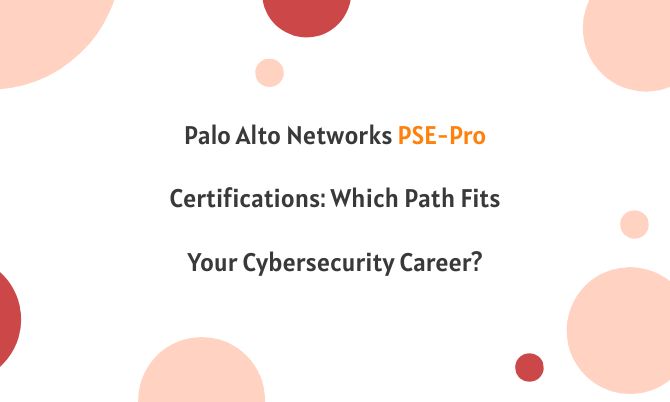Palo Alto Networks offers a range of Professional-level System Engineer (PSE) certifications to validate hands-on expertise across its core platforms. Among the most in-demand are the PSE-Prisma-Pro-24, PSE-Strata-Pro-24, and PSE-SWFW-Pro-24 certifications, which focus on cloud security, physical firewall deployments, and virtual firewall solutions, respectively. These certifications are designed to empower engineers and architects with the skills needed to design, deploy, and optimize Palo Alto's security technologies across diverse infrastructures.
PSE-Prisma-Pro-24 System Engineer – Prisma Cloud Professional
The PSE-Prisma-Pro-24 certification targets professionals working with Prisma Cloud, Palo Alto Networks’ comprehensive cloud-native security platform. This certification validates your expertise in securing applications and data across multicloud environments (AWS, Azure, GCP, etc.) and containerized workloads (Kubernetes, Docker, etc.).
Key Skills Validated:
Cloud infrastructure visibility and risk analysis
Secure posture management and compliance
Threat detection in containerized environments
CI/CD pipeline integration for DevSecOps
Managing Prisma Cloud Compute policies
Ideal for:
Cloud security architects, DevSecOps engineers, and system engineers supporting cloud-native applications.
PSE-Strata-Pro-24 System Engineer – Hardware Firewall Professional
The PSE-Strata-Pro-24 certification focuses on Palo Alto's Strata platform, particularly the physical (hardware) firewall appliances that protect on-premises and hybrid enterprise networks. This certification demonstrates a system engineer's ability to design, deploy, and troubleshoot next-generation firewalls in complex network topologies.
Key Skills Validated:
Deployment and configuration of hardware firewalls
Security policy management and traffic inspection
High availability and redundancy setup
Threat prevention using advanced security subscriptions
Logging, monitoring, and reporting via Panorama
Ideal for:
Network security engineers and system integrators managing on-prem or hybrid infrastructures.
PSE-SWFW-Pro-24 System Engineer – Software Firewall Professional
The PSE-SWFW-Pro-24 certification is tailored for engineers working with virtualized firewalls and Palo Alto's software firewall solutions, such as VM-Series and CN-Series (for containers). It validates the skills required to integrate firewalls into virtualized, cloud, and SDN environments.
Key Skills Validated:
Deploying VM-Series in AWS, Azure, GCP, or VMware environments
Managing container-native firewalls in Kubernetes clusters
Automation via Terraform, Ansible, and APIs
Advanced security configuration and policy enforcement
Integration with public cloud network architectures
Ideal for:
Cloud engineers, virtualization specialists, and anyone deploying virtualized security solutions.
Why Earn a PSE Professional Certification?
By achieving one or more of these certifications, professionals can:
Validate their advanced technical knowledge of Palo Alto solutions
Gain recognition as a trusted cybersecurity expert in specific domains
Boost career prospects in a competitive job market
Support their organization’s cybersecurity strategy across cloud, hybrid, and on-prem architectures
Each certification is also a key milestone toward deeper specialization and may serve as a prerequisite for Palo Alto’s advanced or specialist tracks.
Whether you're securing a traditional data center, a modern cloud-native environment, or a hybrid infrastructure, Palo Alto Networks offers a PSE certification that aligns with your technical focus. The PSE-Prisma-Pro-24, PSE-Strata-Pro-24, and PSE-SWFW-Pro-24 certifications each open new doors in the ever-growing field of cybersecurity. Earning one of these credentials is a powerful way to demonstrate your expertise and commitment to keeping organizations secure.
